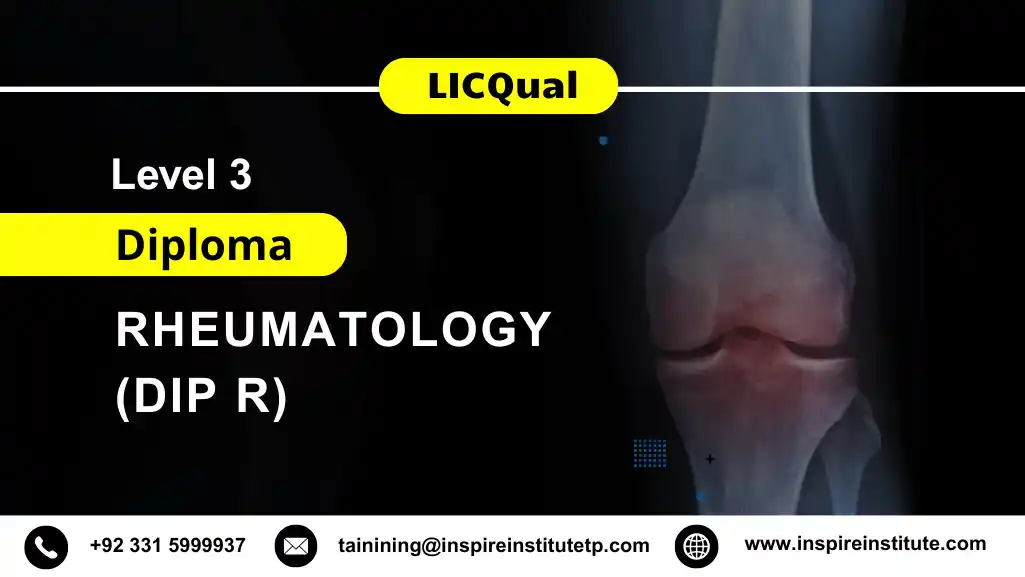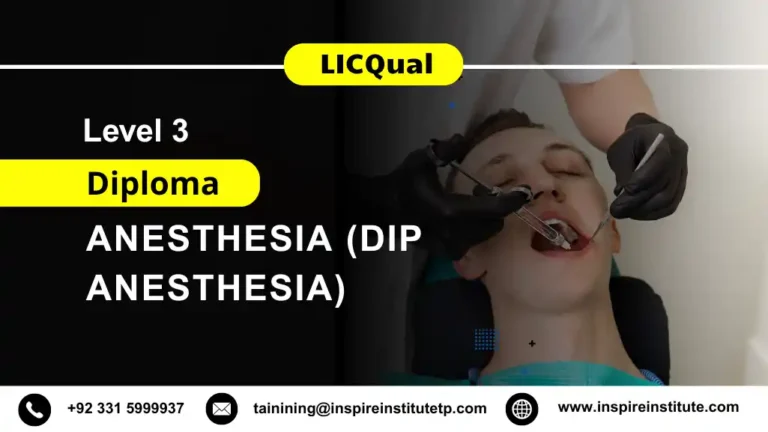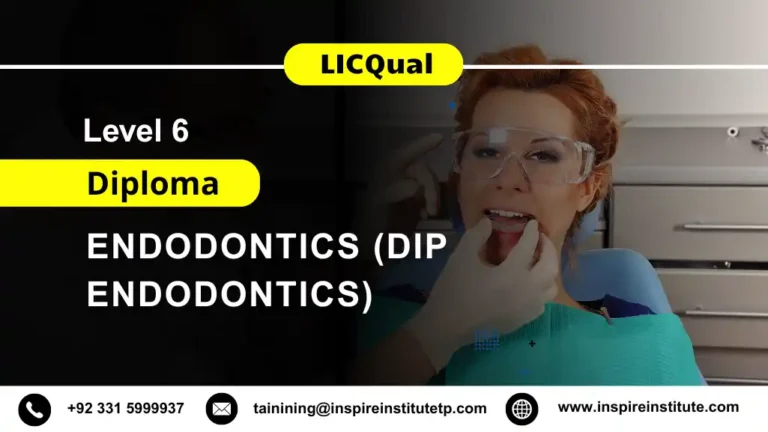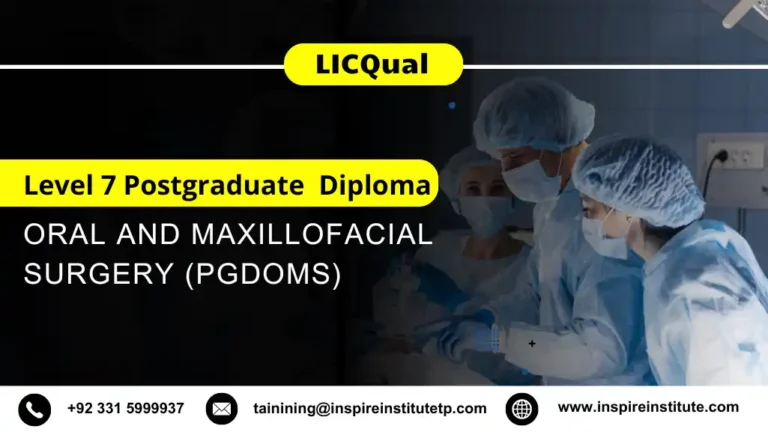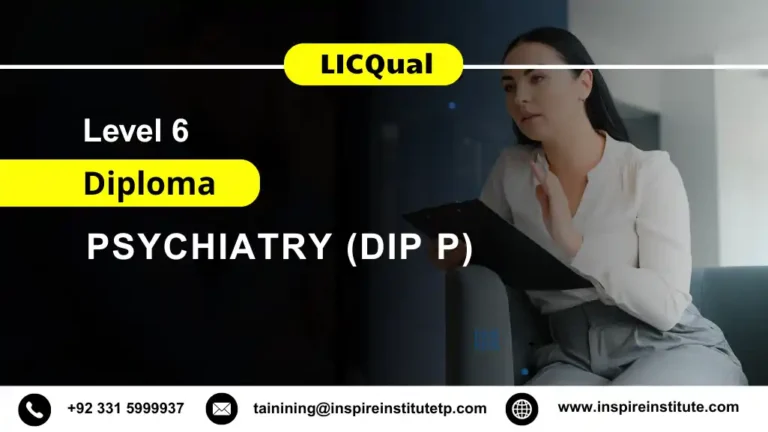LICQual Level 3 Diploma in Rheumatology (Dip R)
The LICQual Level 3 Diploma in Rheumatology (Dip R) is a globally recognized qualification designed to provide healthcare professionals with a comprehensive understanding of rheumatic diseases, their diagnosis, and management. In today’s healthcare landscape, where musculoskeletal and autoimmune disorders are increasingly common, the need for well-trained specialists in rheumatology continues to grow. This course equips learners with the knowledge and clinical insight necessary to excel in the field, making it an ideal choice for medical practitioners, nurses, and allied health professionals seeking to enhance their expertise.
The Diploma in Rheumatology covers a wide range of topics, including the pathophysiology of rheumatic diseases, principles of clinical assessment, diagnostic techniques, and modern therapeutic interventions. Learners gain a deep understanding of common and complex conditions such as rheumatoid arthritis, lupus, gout, vasculitis, and connective tissue disorders. The course also focuses on evidence-based approaches to patient care, enabling participants to make informed clinical decisions that improve patient outcomes and quality of life.
Throughout the Dip R qualification, learners develop essential professional skills in clinical reasoning, diagnostic interpretation, and multidisciplinary teamwork. The programme emphasizes the importance of integrating laboratory data, imaging results, and clinical symptoms to achieve accurate diagnoses. By combining theoretical study with practical application, the course helps learners translate academic knowledge into real-world medical practice, ensuring competence and confidence in managing rheumatologic cases.
Practical application is at the heart of this rheumatology course, with case-based learning, patient simulations, and clinical scenario discussions designed to enhance diagnostic accuracy and treatment planning. These activities prepare learners for real clinical environments, equipping them with hands-on experience and critical thinking skills. Graduates of this course are capable of applying rheumatology principles effectively within hospitals, outpatient clinics, and research settings.
By completing the LICQual Level 3 Diploma in Rheumatology (Dip R), professionals not only strengthen their medical expertise but also open new doors for career advancement in healthcare and medical research. The qualification demonstrates a strong commitment to clinical excellence and professional development. Whether you aim to specialize in rheumatology or expand your practice scope, this diploma serves as a valuable step toward becoming a recognized authority in musculoskeletal and autoimmune disease management.
Why Choose this Qualification
The LICQual Level 3 Diploma in Rheumatology (Dip R) is a distinguished qualification designed to provide a deep and practical understanding of rheumatologic science, diagnostics, and patient management. As autoimmune and musculoskeletal disorders continue to rise worldwide, the need for well-trained specialists in rheumatology is more critical than ever. This diploma equips learners with advanced knowledge, clinical insight, and analytical skills that are essential to diagnose, manage, and treat a wide range of rheumatic conditions effectively. Whether you are a healthcare professional looking to specialize or a clinician seeking career progression, this qualification serves as a solid platform for professional growth and recognition in the healthcare sector.
Key Reasons to Choose this Qualification
1. Comprehensive Understanding of Rheumatic Diseases
• Gain in-depth knowledge of autoimmune and inflammatory diseases such as rheumatoid arthritis, lupus, and gout.
• Understand the underlying mechanisms of musculoskeletal and connective tissue disorders.
• Learn to differentiate between various rheumatic conditions through clinical assessment and laboratory findings.
• Study evidence-based approaches to diagnosis, treatment, and long-term management of rheumatic patients.
• Develop a critical understanding of the biological and environmental factors influencing rheumatic disease progression.
2. Advanced Diagnostic and Clinical Assessment Skills
• Learn to interpret laboratory tests, imaging results, and physical assessments accurately.
• Acquire practical diagnostic skills used in modern rheumatology clinics and hospitals.
• Gain hands-on experience in analyzing patient data, identifying early symptoms, and planning interventions.
• Understand how to use diagnostic tools such as musculoskeletal ultrasound and MRI for precise evaluations.
• Develop competence in formulating differential diagnoses and recommending appropriate treatment pathways.
3. Focus on Evidence-Based Practice and Research
• Learn how to apply evidence-based medicine to clinical decision-making in rheumatology.
• Explore recent research studies and global clinical guidelines in rheumatology.
• Build the ability to critically appraise and implement scientific findings into real-world practice.
• Understand ethical considerations and methodologies in clinical research.
• Strengthen your skills in evaluating and conducting small-scale research projects relevant to rheumatologic care.
4. Enhancement of Clinical Decision-Making Skills
• Gain the confidence to make sound clinical judgments in complex patient cases.
• Learn to assess multiple treatment options based on evidence and patient needs.
• Build the ability to create personalized care plans for chronic rheumatologic conditions.
• Understand the role of multidisciplinary teams in clinical decision-making.
• Improve analytical thinking to respond effectively to evolving clinical challenges.
5. Practical and Applied Learning Experience
• Participate in case-based learning activities reflecting real-world clinical situations.
• Engage in simulated patient assessments to enhance hands-on learning.
• Develop problem-solving skills through interactive assignments and clinical scenarios.
• Gain insights from expert tutors and healthcare professionals experienced in rheumatology.
• Apply classroom learning directly to practical environments, ensuring competence and readiness.
6. Career Advancement and Professional Recognition
• Strengthen your professional profile with an internationally recognized qualification.
• Open doors to specialized roles in hospitals, research institutions, and healthcare organizations.
• Demonstrate advanced clinical and diagnostic skills to employers and peers.
• Enhance your eligibility for leadership or supervisory positions in healthcare settings.
• Build a pathway toward further specialization or advanced rheumatology certifications.
7. Global Relevance and Industry-Recognized Accreditation
• Earn a qualification accredited by LICQual, a respected UK-based awarding body.
• Benefit from a curriculum aligned with international healthcare and academic standards.
• Gain transferable skills applicable across various healthcare systems worldwide.
• Join a network of healthcare professionals and graduates recognized globally.
• Enhance employability both locally and internationally through a respected qualification.
8. Flexible, Accessible, and Professionally Structured Learning
• Study through an accessible format that accommodates working professionals.
• Benefit from structured assessments designed to measure practical and theoretical progress.
• Receive personalized tutor support and academic feedback throughout the course.
• Learn through well-organized study materials, resources, and guidance tailored for success.
• Manage your learning journey at your own pace without compromising professional commitments.
The LICQual Level 3 Diploma in Rheumatology (Dip R) is more than an academic qualification—it is a transformative professional development journey. Learners not only gain theoretical knowledge and diagnostic expertise but also cultivate the confidence to deliver patient-centered, evidence-based care. Completing this diploma demonstrates your commitment to excellence in rheumatology and positions you for leadership, research, and advanced clinical practice roles worldwide. Choosing this qualification means choosing a future built on credibility, competence, and continuous growth in the field of rheumatology.
Course Overview
LICQual UK Awarding Body
Average Completion Time:
4-12 Months
Study Units: 6 Units
Evidence & Assignment Based
Mandatory Units
Who Should Take This Course
The LICQual Level 3 Diploma in Rheumatology (Dip R) is designed for individuals passionate about advancing their knowledge and expertise in the field of rheumatology and musculoskeletal medicine. This professional qualification caters to a broad range of learners within healthcare and related disciplines who wish to gain an in-depth understanding of rheumatic disorders, their diagnosis, management, and prevention. Whether you are a practicing healthcare professional, a medical student, or someone looking to enter the healthcare industry, this diploma provides a solid foundation in both theoretical and practical aspects of rheumatologic care.
This Course is Suitable For
1. Medical Practitioners and General Physicians
• Gain specialized skills to accurately diagnose and manage rheumatic and autoimmune diseases.
• Expand clinical competencies to provide comprehensive patient care in hospital and outpatient settings.
• Understand evidence-based management of complex rheumatologic conditions like arthritis and lupus.
• Strengthen clinical decision-making by integrating laboratory findings and imaging interpretations.
• Enhance professional qualifications for career progression or subspecialization in rheumatology.
2. Nurses and Allied Health Professionals
• Develop an understanding of musculoskeletal and connective tissue diseases from a multidisciplinary perspective.
• Acquire patient assessment and monitoring skills to support rheumatologic treatment plans.
• Learn to assist in the management and rehabilitation of patients with chronic rheumatic conditions.
• Gain confidence in communicating with patients and families about disease management and lifestyle modification.
• Broaden your role in patient education, early symptom recognition, and holistic care delivery.
3. Physiotherapists and Rehabilitation Specialists
• Understand the functional and biomechanical aspects of rheumatic diseases.
• Learn techniques for designing effective rehabilitation and mobility improvement programs.
• Develop therapeutic strategies that promote joint protection and pain management.
• Gain insights into working collaboratively with rheumatologists and multidisciplinary teams.
• Enhance your clinical practice by integrating evidence-based exercise and recovery interventions.
4. Medical and Healthcare Students
• Build a strong academic foundation in rheumatologic principles and musculoskeletal health.
• Learn clinical reasoning skills that prepare you for real-world medical environments.
• Gain exposure to diagnostic methods and laboratory procedures relevant to rheumatology.
• Strengthen your understanding of immunology, pathology, and chronic disease mechanisms.
• Prepare for advanced study or future specialization through a structured and recognized course.
5. Pharmacists and Clinical Researchers
• Learn about pharmacologic interventions used in rheumatologic disease management.
• Understand the mechanisms of anti-inflammatory and immunosuppressive drugs.
• Acquire knowledge about clinical trials, medication safety, and treatment outcomes.
• Develop research skills focused on therapeutic innovations and evidence-based practice.
• Contribute to advancing rheumatology through informed pharmaceutical and clinical research.
6. Healthcare Administrators and Clinical Managers
• Gain insights into the organization and management of rheumatology departments and clinics.
• Learn about clinical protocols, patient safety standards, and healthcare compliance.
• Strengthen leadership abilities to manage multidisciplinary teams in clinical settings.
• Understand data management, audit procedures, and patient care quality improvement.
• Enhance strategic decision-making within healthcare systems and medical organizations.
7. Public Health and Community Health Professionals
• Understand the epidemiology and social determinants of rheumatic diseases.
• Learn preventive strategies to reduce the burden of musculoskeletal conditions.
• Develop community-based awareness programs for early detection and intervention.
• Strengthen policy-making skills in the area of chronic disease prevention and health promotion.
• Contribute to national health initiatives focused on improving population-level outcomes.
8. International Learners and Aspiring Specialists
• Obtain a globally recognized UK qualification in rheumatology.
• Gain expertise applicable to diverse healthcare systems around the world.
• Learn flexible, distance-based methods suited for global learners and working professionals.
• Enhance international employability and professional credibility through an accredited diploma.
• Join a community of healthcare professionals pursuing excellence in rheumatologic education and practice.
The LICQual Level 3 Diploma in Rheumatology (Dip R) is ideal for anyone aiming to strengthen their professional capabilities and contribute meaningfully to patient care in the field of rheumatology. By combining theoretical excellence with clinical application, this qualification opens new pathways for career growth, research, and specialized practice. Whether you are beginning your medical journey or seeking to enhance existing skills, this diploma offers the expertise, recognition, and global perspective necessary to excel in rheumatologic healthcare.ng skills, this diploma offers the expertise, recognition, and global perspective necessary to excel in rheumatologic healthcare.
Course Benefits
The LICQual Level 3 Diploma in Rheumatology (Dip R) provides significant benefits for individuals aiming to specialize in rheumatology, musculoskeletal medicine, and autoimmune disease management. By combining strong theoretical knowledge with clinical applications, this diploma empowers learners to diagnose, manage, and prevent a wide range of rheumatic conditions effectively. Designed as a flexible, assignment-based programme, it supports professional development while maintaining the highest academic and clinical standards relevant to today’s healthcare landscape.
Key Benefits of the Course:
- Specialist Knowledge:
• Gain a deep understanding of musculoskeletal and connective tissue diseases, including arthritis, lupus, and gout.
• Learn about the pathophysiology, immunology, and diagnostic principles of rheumatic conditions.
• Study evidence-based treatment strategies and rehabilitation methods for acute and chronic disorders.
• Understand the relationship between autoimmune mechanisms and systemic inflammation.
• Develop the ability to interpret diagnostic findings, such as lab tests and imaging, for accurate disease identification. - Practical Application:
• Build essential clinical skills in assessing, diagnosing, and managing rheumatologic conditions.
• Learn techniques for physical examination, joint assessment, and interpretation of imaging reports.
• Apply knowledge through case studies, simulations, and real-world clinical scenarios.
• Strengthen analytical and decision-making skills to provide effective patient-centered care.
• Ensure readiness to work confidently in hospitals, clinics, and rehabilitation centers. - Recognised Qualification:
• Earn a UK-accredited diploma that validates your advanced knowledge and clinical expertise in rheumatology.
• Gain international recognition aligned with global healthcare and medical education standards.
• Strengthen your professional profile for career advancement in healthcare and academic institutions.
• Demonstrate credibility and clinical competence through an internationally respected certification.
• Enhance employability in multidisciplinary healthcare and research environments worldwide. - Flexible Learning Pathway:
• Benefit from an assignment-based structure designed for working professionals and part-time learners.
• Study at your own pace and complete assessments that measure both theory and practical performance.
• Access detailed learning resources, clinical materials, and tutor guidance throughout your studies.
• Balance your academic growth with existing professional or personal commitments.
• Achieve a recognized qualification while maintaining flexibility and convenience in learning. - Evidence-Based Training:
• Study current clinical guidelines and research advancements in rheumatology and autoimmune medicine.
• Apply evidence-based approaches to diagnosis, treatment, and rehabilitation.
• Understand patient-centered care and its role in improving long-term outcomes.
• Strengthen your ability to critically evaluate scientific literature and apply findings in practice.
• Promote safe, effective, and ethical clinical practice in rheumatology care. - Career Development:
• Expand career opportunities across hospitals, rehabilitation centers, research institutes, and healthcare organizations.
• Prepare for roles such as Rheumatology Specialist, Clinical Practitioner, or Healthcare Consultant.
• Build a strong foundation for further studies in immunology, musculoskeletal medicine, or clinical sciences.
• Gain the expertise needed to transition into advanced roles in healthcare management and patient education.
• Enhance employability and professional growth through a globally recognized qualification. - Enhanced Rheumatology Care Delivery:
• Contribute to better patient outcomes through accurate diagnosis and evidence-based treatment.
• Develop the skills to support patients in managing chronic pain, mobility issues, and inflammatory conditions.
• Promote preventive healthcare and lifestyle awareness to reduce rheumatic disease progression.
• Apply multidisciplinary approaches to optimize patient care and rehabilitation.
• Support public health initiatives aimed at improving musculoskeletal and autoimmune disease management. - Professional Growth:
• Strengthen clinical, analytical, and communication skills essential for patient interaction and care coordination.
• Cultivate empathy, ethics, and professionalism within the clinical environment.
• Develop leadership qualities to guide and mentor others in rheumatology and allied healthcare.
• Gain confidence in delivering high-quality healthcare and participating in collaborative care models.
• Prepare to play a vital role in advancing rheumatologic healthcare standards worldwide.
The LICQual Level 3 Diploma in Rheumatology (Dip R) equips learners with comprehensive theoretical knowledge, clinical competence, and a UK-recognised qualification. It empowers healthcare professionals and aspiring practitioners to improve patient outcomes, advance clinical practice, and contribute to global healthcare excellence in rheumatology and musculoskeletal medicine.
Eligibility Criteria
The LICQual Level 3 Diploma in Rheumatology (Dip R) is a UK-accredited qualification designed for healthcare professionals, medical assistants, physiotherapists, and aspiring clinicians who wish to develop a comprehensive understanding of rheumatology, musculoskeletal health, and autoimmune disease management. This assignment-based programme integrates theoretical learning with clinical applications, making it ideal for individuals aiming to specialize in rheumatologic care or advance within the healthcare profession. Learners who meet the entry requirements will be well-prepared to succeed in this programme and apply their knowledge in hospitals, rehabilitation centers, clinics, and research institutions.
Educational Background:
Applicants should possess a recognised qualification in healthcare, medicine, nursing, or a science-related discipline. Candidates holding a Level 2 or Level 3 qualification in healthcare practice, biology, physiotherapy, biomedical sciences, or related subjects are eligible to apply. Individuals with equivalent international qualifications will also be considered, provided their credentials align with the academic standards of the programme. The course is particularly suitable for learners with an educational background in health sciences, medical technology, or allied health fields seeking to build expertise in rheumatology and musculoskeletal medicine.
Professional Experience:
Previous professional experience in healthcare, patient care, or clinical environments is advantageous but not compulsory. A minimum of one year of experience in a healthcare-related role—such as nursing, physiotherapy, medical assistance, or community health—is recommended. Applicants who have worked in hospitals, clinics, or rehabilitation settings will find the course especially beneficial. However, motivated individuals without direct healthcare experience but with a keen interest in rheumatology are also encouraged to apply, as the programme provides strong foundational training to support career development.
Age Requirement:
Learners must be at least 18 years of age at the time of enrollment. This ensures that students possess the maturity, responsibility, and professional awareness necessary to engage with the theoretical, ethical, and practical dimensions of rheumatology. The age requirement reflects the professional nature of the qualification and prepares learners to handle real-world healthcare situations with competence and care.
Language Proficiency:
As the LICQual Level 3 Diploma in Rheumatology (Dip R) is taught and assessed in English, all learners must demonstrate proficiency in reading, writing, and communication. Non-native English speakers are required to have an IELTS score of 6.0 or an equivalent qualification, ensuring they can effectively engage with academic materials, complete written assignments, and communicate confidently in professional healthcare settings. Strong English skills are essential for interpreting clinical data, preparing reports, and interacting with patients and colleagues.
Technical Requirements:
Applicants should have access to a computer or laptop with a stable internet connection, as the course is delivered through an online, assignment-based format. Basic IT literacy is essential for managing online learning platforms, conducting research, and submitting coursework electronically. Familiarity with digital tools such as word processors, presentation software, and online academic resources will enhance the learning experience and facilitate smooth course progression.
Required Documents:
To complete the registration process, applicants must submit the following documents:
• A valid passport or national ID for identity verification.
• Proof of educational qualifications, such as certificates or transcripts.
• Evidence of relevant work or professional experience, if applicable.
• For international applicants, certified translations of documents may be required for verification purposes.
All submitted materials will be reviewed to ensure that candidates meet the suitability standards and academic criteria necessary for successful participation in the programme.
The Qualification Process
LICQual Level 3 Diploma in Rheumatology (Dip R) follows a structured pathway to ensure learners gain comprehensive knowledge, practical skills, and professional competence in community oral healthcare.
Step 1: Self-Assessment
Learners review the entry requirements to confirm eligibility. Candidates with a background in dentistry, oral health, or public health are encouraged to apply.
Step 2: Registration
Complete the registration process by submitting required documents such as proof of qualifications, a valid ID, and payment of enrollment fees.
Step 3: Induction
An induction session is conducted to:
- Verify learner eligibility and documentation.
- Introduce study materials, learning outcomes, and assessment procedures.
Step 4: Learning and Evidence Submission
Learners complete assignments, case studies, and practical exercises demonstrating competence in public health dentistry, community oral health assessment, preventive strategies, and program planning.
Step 5: Feedback and Revision
Assessors review submitted evidence and provide constructive feedback. Learners can revise and resubmit work to meet all required standards.
Step 6: Competence Validation
Final submissions are evaluated to confirm that learners have met all theoretical and practical learning outcomes.
Step 7: Internal Quality Assurance (IQA)
The IQA team reviews the assessment process to ensure accuracy, fairness, and compliance with international standards.
Step 8: External Verification (EQA)
External verifiers validate the authenticity and quality of learner achievements.
Step 9: Certification
Upon successful verification, learners are awarded LICQual Level 3 Diploma in Rheumatology (Dip R) , demonstrating advanced proficiency in community oral healthcare and preparing them for professional growth in dental public health, preventive dentistry, and healthcare policy.

